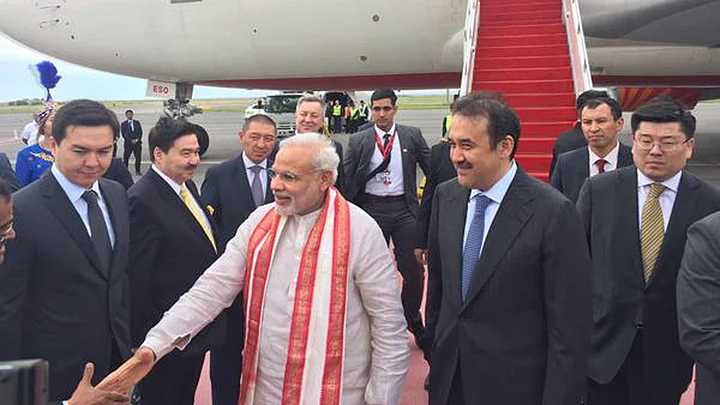Prime Minister Narendra Modi’s first visit to Central Asia will raise India’s profile in its extended neighbourhood and give it a toe-hold in an energy-rich region where a new Great Game is being played out by world powers.
Modi’s political outreach has come at a time when there is considerable churning in the area. Russia, the US and China are the big players, and neighbours like Pakistan and Iran are also present. Besides, there are a host of other countries trying to jostle. Yet, despite centuries of links with Central Asia, India has just a peripheral presence here.
But at the moment there is some space opening out for India. A tad uncomfortable with the overpowering presence of Russia, China, and a US government in retreat, Central Asian leaders are looking to India as an alternative force.
The confluence of forces has provided a perfect opportunity for India to leverage its footprints in the region and forge closer strategic, military and economic ties.
— Nandan Unnikrishnan, Observer Research Foundation
Engaging Central Asian Countries
It is for the Indian leadership to grab the opportunity and Modi may just be the person to turn things round. Whether New Delhi will deliver on its promises and continue to remain engaged remains to be seen. The hectic trip through Uzbekistan, Kazakhstan, Turkmenistan, Kyrgyzstan and Tajikistan will be worthwhile only if follow-up action is seriously pursued. Very often they fizzle out after an otherwise successful trip.
No big ticket announcements are expected from the Central Asian visit. The focus instead will be on quiet conversations behind closed doors, which will lay the ground for better strategic ties. Modi will try to leverage the space which New Delhi believes does exist at the moment. Defence cooperation will be high on the agenda and so too will anti-terror cooperation.
Central Asian nations are fighting the scourge of Islamic militancy and the appearance of the IS in the neighbourhood is an added problem for regional leaders. The situation in Afghanistan and IS’ foray in that country is a major worry not just for Kabul, but for New Delhi and the Central Asian countries as well.
Bilateral Agreements
There will be several bilateral agreements centred round cooperation in health, education, institution building and info-tech. There will also be some talk on gas and oil, but it will mainly be the start of a process. Turkmenistan, Afghanistan, Pakistan and India (TAPI), encouraged by America, has long been talking of a gas pipeline project, but so far it has been just talk. Considering the rising strength of jihadi forces as well as the Taliban in Afghanistan, not much forward movement can be expected in the near future.
Modi will also pitch India’s soft power with the setting up of a Traditional Medicine and Yoga Centre in Turkmenistan, encouraging Hindi, Indian music and dwelling on historical links with the region.
Before leaving for Uzbekistan, Narendra Modi said:
It is well known that Indian movies, language and music are very popular in Uzbekistan...During this visit I would be interacting with Indologists, students of Hindi and members of the Indian community.
Going Beyond Yoga and Bollywood
But New Delhi’s engagement with Central Asia must move beyond yoga, Bollywood, and propagating Hindi. India must play hardball.
Central Asia is slowly slipping into Chinese hands. President Xi Jinping’s One Belt One Road initiative, where investing billions of dollars will make China a geopolitical power house in the region.
—Ambassador Rajiv Sikri, who has served in the region.
The new ‘Silk Road’ economic belt linking China to Europe cuts through the heart of Central Asian countries. “Looking West from Delhi, the scene is not reassuring,’’ adds Sikri. He says that the China-Pakistan axis is cemented anew by the $46 billion announcement during Xi’s Pakistan visit a few months ago. Islamabad will help Beijing reach across to Afghanistan. China, which was indifferent about Afghanistan in the past is now hosting Taliban delegations.
Easing Connectivity
With connectivity a major problem for access to Central Asia, Sikri suggests that New Delhi must look to Iran. The Chabahar port will give a boost to connectivity. He urges Modi to reach out to Iran.
I hope he meets President Hassan Rouhani when both attend the SCO, which will be more important than meeting Nawaz Sharif.
—Ambassador Rajiv Sikri
India has been working on Chabahar with Iran in fits and starts for over a decade. With Pakistan refusing to give access to India through its territory, the only way out was developing the Chabahar port. Sikri will be happy to know that Modi discussed the North-South Transport Corridor with Uzbek President Islam Karimov on June 6 when he invited Uzbekistan to be a member. The prime movers for this multi-modal transport project was Russia, Iran and India in 2000. Kazakhstan, Kyrgyzstan and Tajikistan are already members.
Chabahar is not just an economic but a strategic project which will help reactivate India’s plans for the North-South corridor.
—Ambassador Rajiv Sikri
Is the PM listening?
(The writer is a Delhi-based freelance journalist.)
